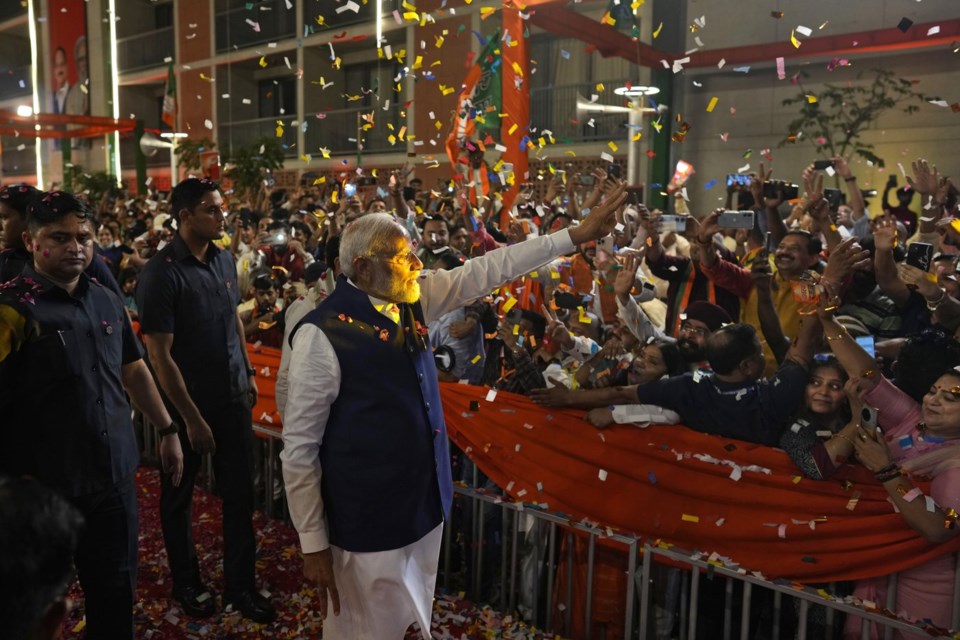OTTAWA — Prime Minister Justin Trudeau congratulated his Indian counterpart Narendra Modi on his re-election Wednesday, but as tensions remain high in the Canada-India relationship, he used the opportunity to reinforce the importance of the rule of law.
Modi won a weeks-long election Tuesday, securing a majority but losing more seats to opposition parties than had been widely expected.
The move could pave the way for bridging a diplomatic rift with Canada, though experts say that will take some time.
"This government in India now needs to have more wins, and I think they might be very willing to work with Canada to have a resolution," said Vijay Sappani, an analyst with the Macdonald-Laurier Institute.
Despite huge amounts of trade between Canada and India, relations have been strained for years over efforts by some Canadians to advocate for a separate Sikh homeland called Khalistan to be carved out of India.
Those tensions reached a fever pitch last fall when Trudeau publicly accused Modi's government of being involved in the killing of Sikh activist Hardeep Singh Nijjar near Vancouver.
In a written statement Wednesday, Trudeau said Canada "stands ready to work together" with India, but this will be "anchored to human rights, diversity and the rule of law."
Sappani said it will be months before the renewed Modi government makes final decisions on a foreign minister and diplomatic outreach, but there's reason to be optimistic.
"Depending on how the Nijjar case evolves, and depending on the appetite on both sides to move forward, we should start seeing an improvement of (the) relationship," he said.
A "good signal" from India would be restoring diplomatic immunity stripped from 41 Canadian envoys last fall.
He noted that the Indian election saw two "hard-line" Khalistan supporters elected to India's parliament, including one who is in jail.
That should serve as proof that the Khalistan movement is popular within India and not just in other countries, he said.
"Canada is going to have some ammunition, but it is in the best interest of both the countries to have these conversations in private."
Sappani added that Canada could work with the United States to seek a guarantee that India will not be involved in future attempts to target Sikhs abroad.
"India has learned this lesson, that you don't do these things in a NATO country," he said.
Sikh independence activists remain highly critical of the Modi government, whose current line in response to the Nijjar killing is that it does not have a policy of assassinating people abroad.
New-York-based activist Gurpatwant Singh Pannun, a close friend of Nijjar's who U.S. prosecutors believe was an assassination target, said the fact Modi's party lost seats doesn't change the level of risk that separatists face.
"This isn't the issue of who's ruling India," Pannun said from Washington, D.C., where he is organizing a protest at the Indian embassy on Thursday.
"Our issue is ... the people of Punjab, whether we are able to get them the right to vote in independence of Punjab or not."
There will be "a lot of apprehension" among Sikhs, said Jasveer Singh, a Vancouver-based spokesman for the Sikh Press Association representing the independence movement.
But he said many in the community feel vindicated to see the shift in public sentiment apparent in the election result.
"To some level, there's no doubt that it definitely reflects a growing disdain for the fanatical, nationalist regime (under) Modi."
The weaker showing for Modi means his Bharatiya Janata Party is more dependent on political allies to form a coalition government, noted Shivaji Mukherjee, an assistant professor of political science at Simon Fraser University in Burnaby, B.C.
He speculated that this could mean the government softens its approach to Muslims, Sikhs and other minority communities in India.
The effect on the international situation is less clear, said Mukherjee.
"It is possible that the BJP's allies in the coalition government may oppose strong counter-insurgency policies both within and outside India, but usually they would be more focused in constraining the BJP's internal policies within India," he said.
Still, he said he believes relations between Canada and India have already been improving, and if there are no major changes to Modi's cabinet, they "will continue to slowly improve."
This report by The Canadian Press was first published June 5, 2024.
Dylan Robertson and Chuck Chiang, The Canadian Press

